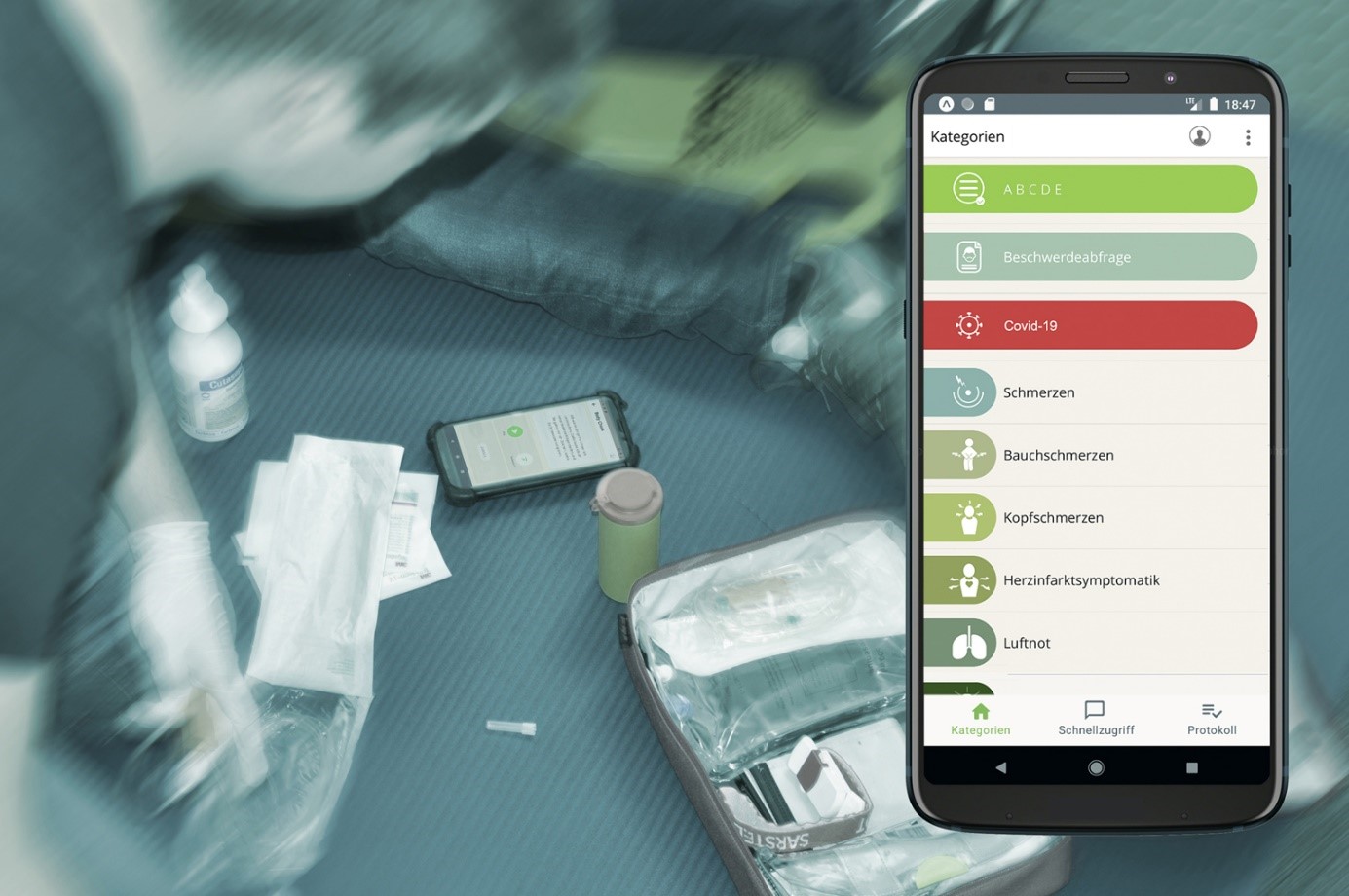
News and Events
October
We are pleased to see that DICTUM project has resonated beyond its investigated field in primary healthcare level (at general medicine clinics). In this context we presented our project at the "14th visceral medical seminar - treatment of gastrointestinal diseases of migrants and non-German speaking patients" of the DRK Clinic North Hessia in Kassel. At this event, the colleagues were overed an hands on experience of the interventional tool.
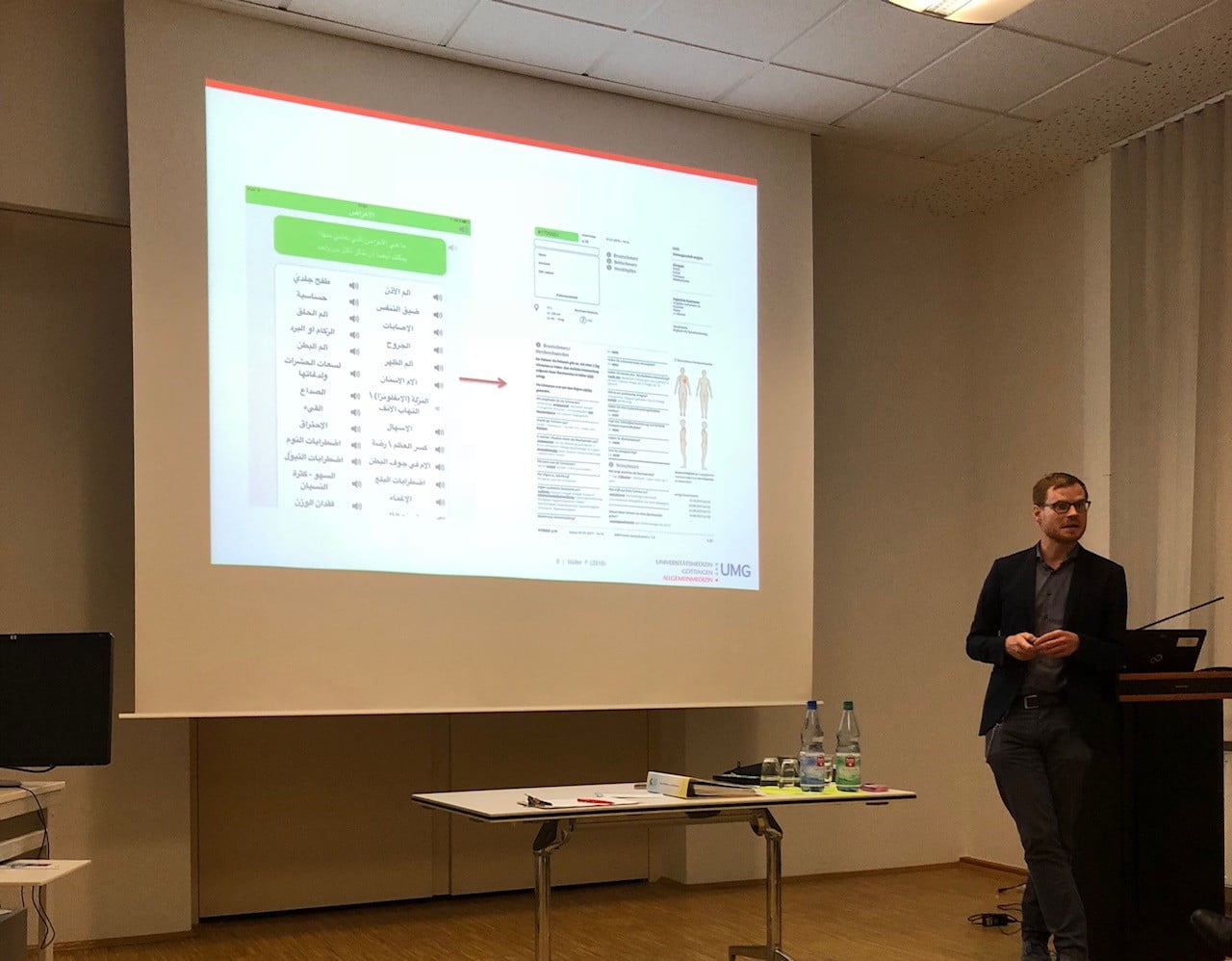
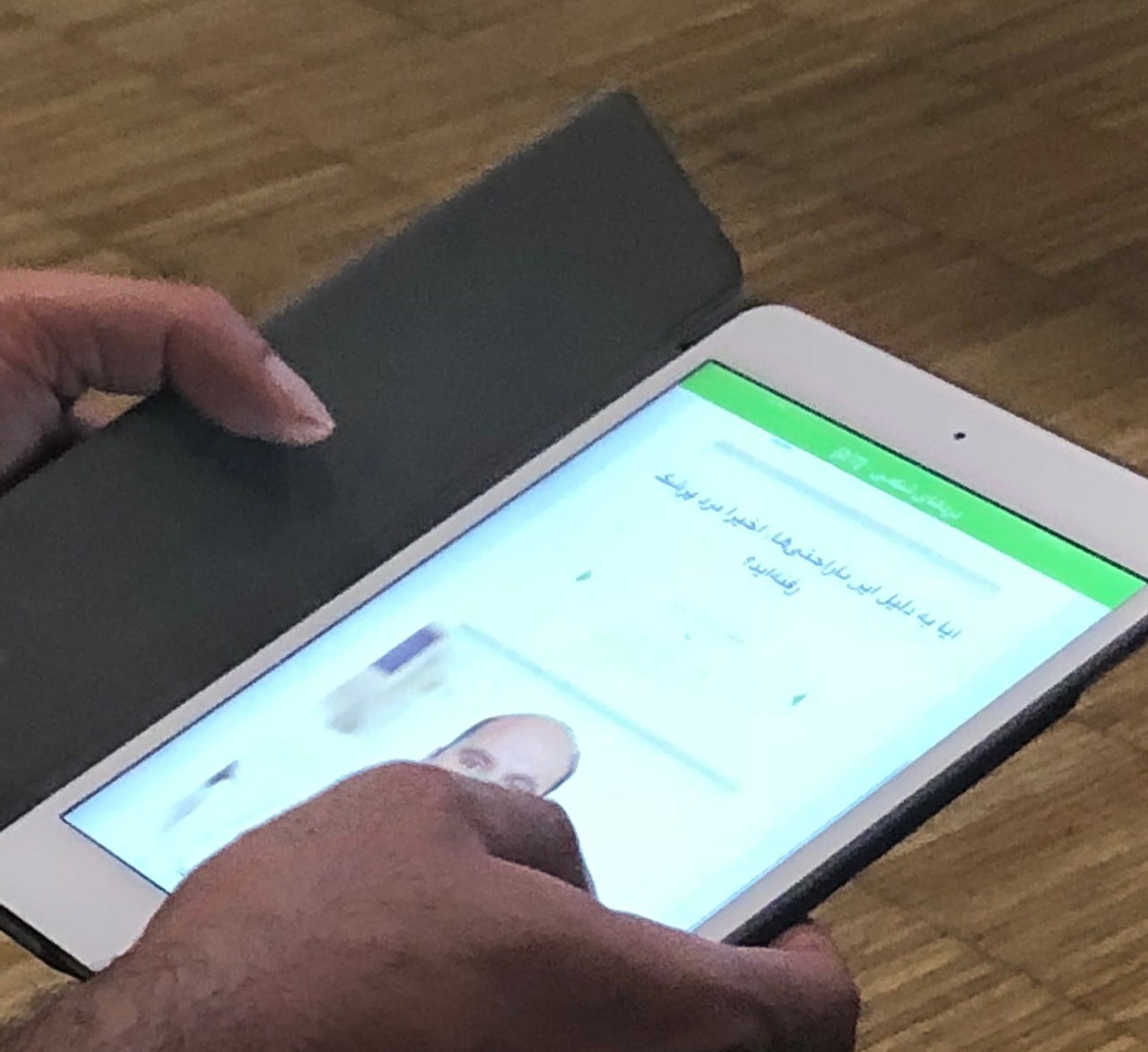
September
In September, we included our 250th patient in the study. Thus, we reached half the recruitment target. We decided to extend the recruitment period until Christmas 2018 to achieve the planned recruitment rate (440 patients using the digital communication assistance tool).
The first coordination processes in the sister project DICTUM-Rescue are now taking place: Work packages are being planned. Meanwhile we are writing diligently with our cooperation partners the study applications, in order to start the testing on a large scale and make it also possible in Braunschweig. Starting next year, we will probably be reporting on our progress on the project
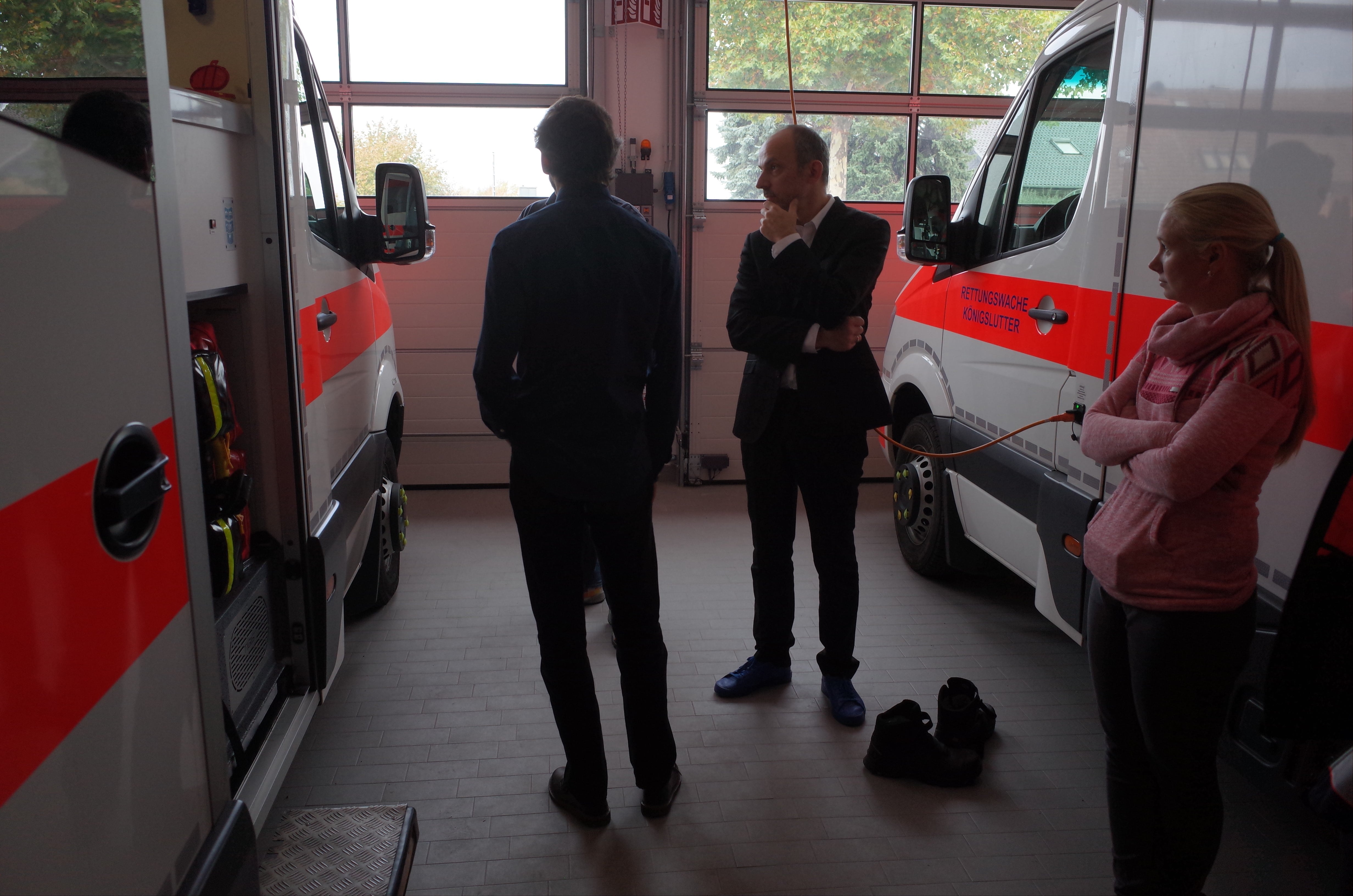
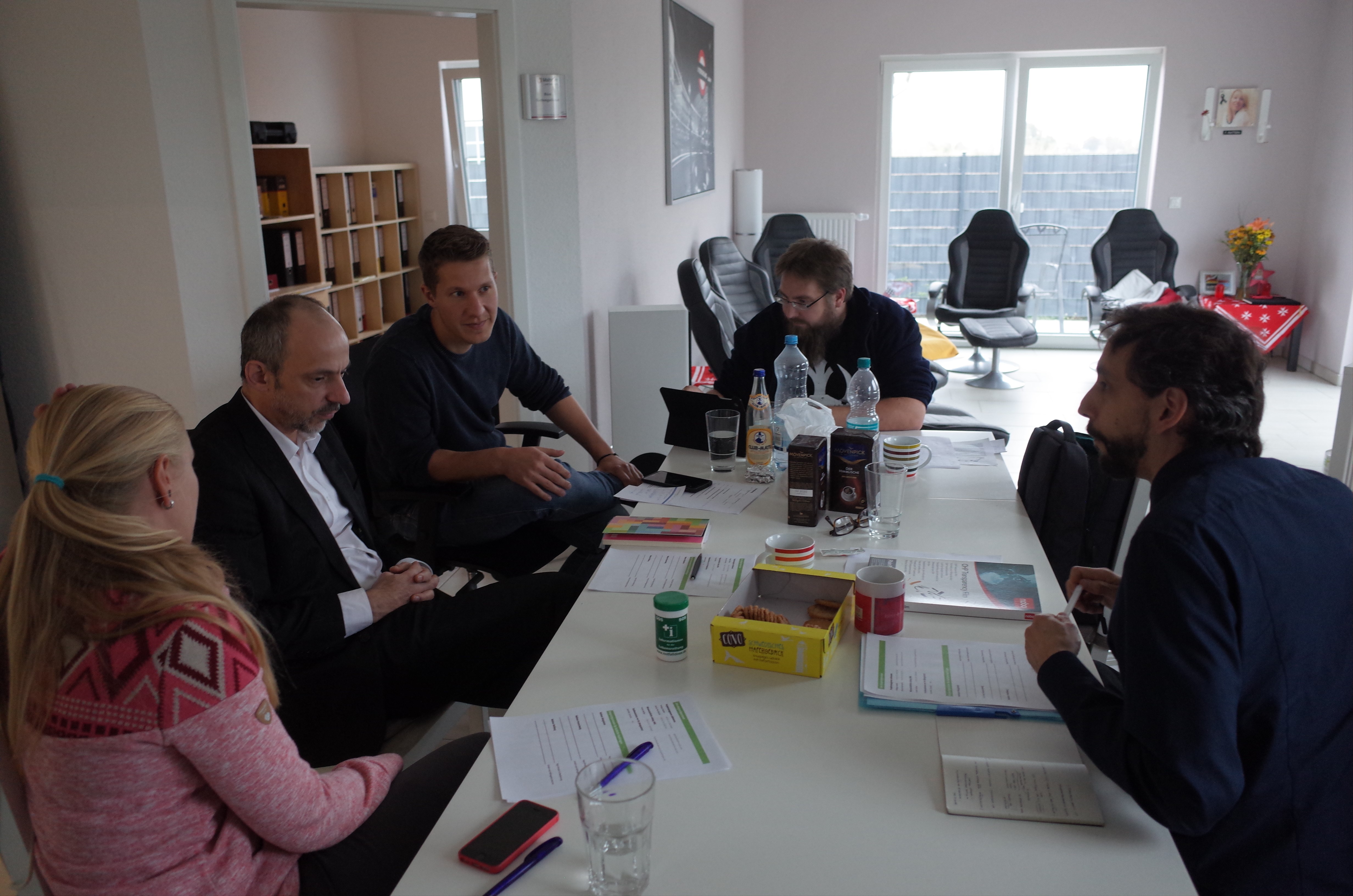
August 2018
Two significant events cast a shadow on August:
Stephan Weil, the prime minister of Lower Saxony, received all lower Saxony, (land of the ideas) projects at the Guesthouse of the state government, including our team. We felt a special appreciation and joy that DICTUM-Friedland was also introduced and discussed in a short presentation. The event was a great recognition and an excellent opportunity to meet the other interesting winner teams and exchange ideas and views.
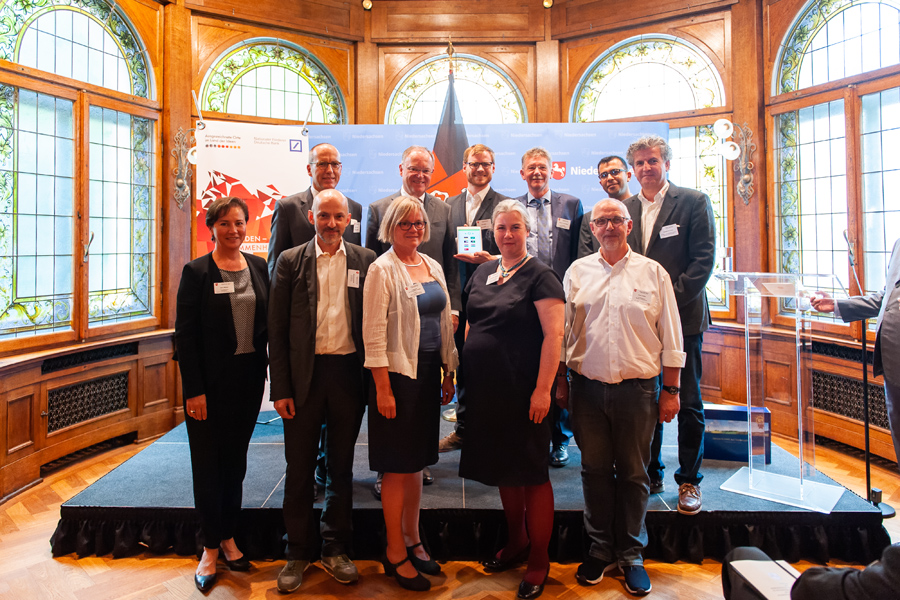
Group picture of DICTUM-Friedland partners and Land-of-ideas representatives with the Prime Minister Stephan Weil
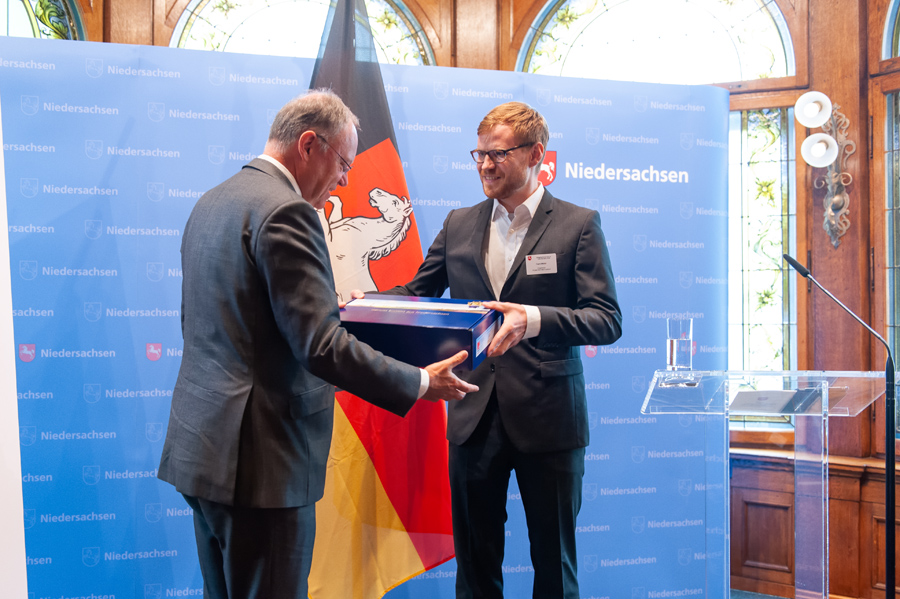
Prime Minister Stephan Weil and Frank Müller (Institute of General Practice)
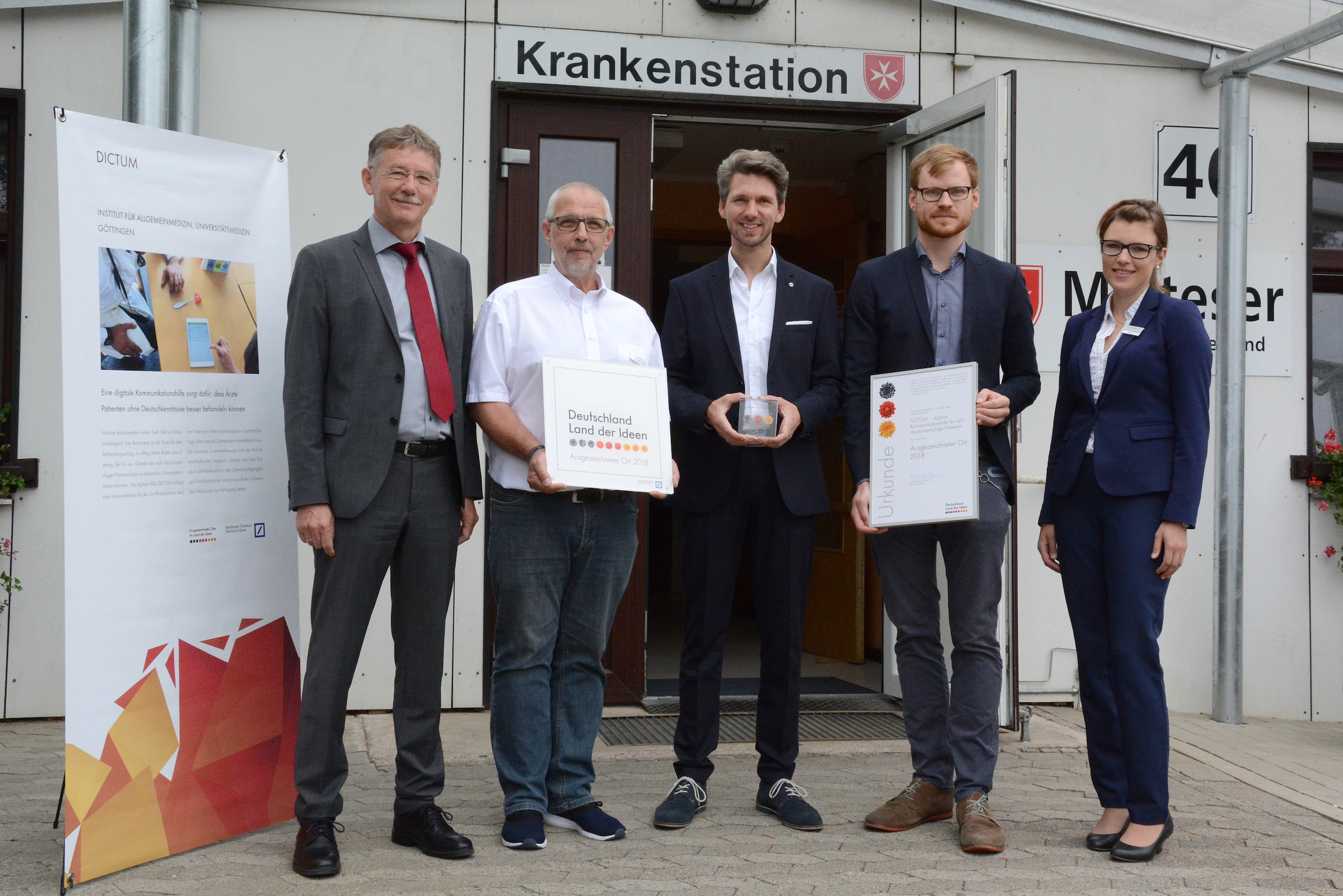
Press event and project introduction in Friedland. From left to right: Heinrich Hörnschemeyer (lower Saxony Land authority), Jürgen Hublitz (Malteser Friedland), Andreas Lippke (aidminutes GmbH), Frank Müller (Institute of General Practice), Corinna Engelke (Health region Göttingen/ south lower Saxony). Photo: Landesaufnahmebehörde Niedersachsen/ Anne Hage
The sister project DICTUM-Rescue-Königslutter has been accepted. The project is funded by the Federal Ministry of Food and Agriculture (BMEL) by a resolution of the German Parliament. The project is sponsored by the Federal Agency for Agriculture and Food (BLE) as part of the federal program for rural development. The project sum includes 244,268 euro (48.853 € introduced contributions ) and enables us to develop the content and technical development of the DICTUM approach to the field of preclinical emergency situations.
A new student helper, Tatjana Bendig, supports DICTUM team as part of the clinical study staff at the primary healthcare center in Friedland. She will be distributing the tablets to the willing participants and moderates the inclusion process.
Research cooperation with the Department of Immunology and Rheumatology of the Hannover Medical School is also bearing fruit. The article "Pregnancy-Related Health Care Needs at Refugees-A Current Three Center Experience in Europe," in which members of DICTUM team are co-authors, has been accepted for publication by the International Journal of Environmental Research and Public Health.
July 2018
At the end of July, we were able to include 100 patients in our clinical trial. With the current participation rate, we are behind the recruitment target, which we ascribe to the current, disease-free 'summer situation.
The medication module, which will organize the communication while giving the drugs, is now fully structured. The content is available in German and will now be translated and recorded step by step. Since the medication information already exists in a database and only the pharmaceutical central number (PZN) has to be scanned to identify the accordingly drug, the procedures are considerably easy to run. Meanwhile, programmers and communication designers are working on intuitive input interfaces.
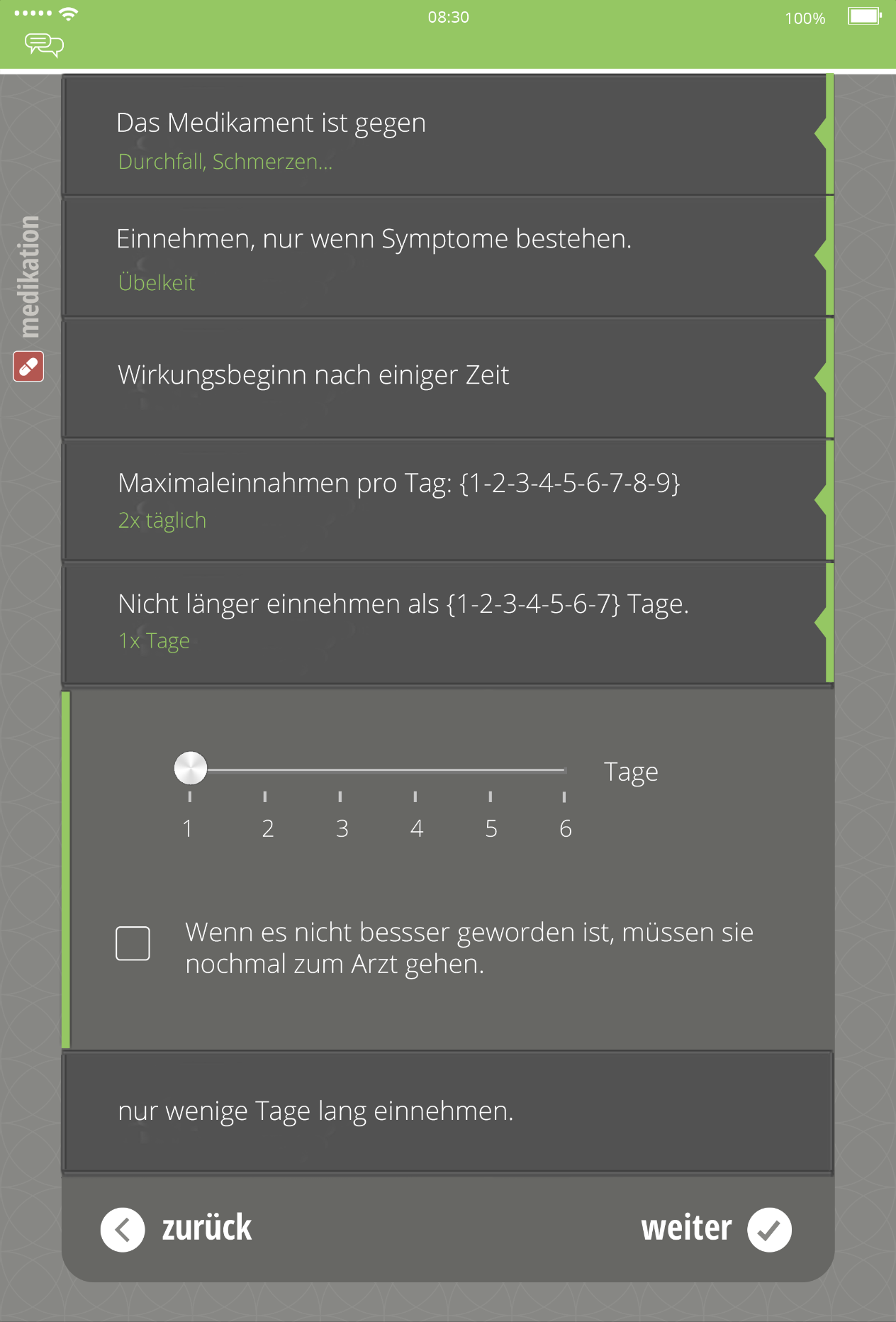
The first look of the model, which clarify the administration of prescribed medication
June 2018
For the time being our doctoral students are keeping themselves busy with collecting data, coding and initial analysis of the preliminary data. They will also be presenting two unique aspects of the so far collected data in DICTUM at the annual congress of the German College of General Practitioners and Family Physicians (DEGAM) in Innsbruck, Austria on:
Implementing a digital communication assistance tool in general practice consultations for refugee patients: first experiences from the DICTUM- Friedland Project.
S. Kruse, F. Müller, Dr. E. Kleinert, G. Furaijat, Prof. Dr. A. Simmenroth
(Panel: IV-OS-5M - Aus der Praxis für die Praxis, Freitag, 14. September 2018, 15:30 - 17:00 – )
Antibiotics use in the medical care of refugee patients.
N. Hillermann, Dr. E. Kleinert, F. Müller, G. Furaijat, Prof. Dr. A. Simmenroth
(Panel: I-VT3 - Familienmedizin und soziale Gerechtigkeit, Donnerstag, 14. September 2018, 16:45 - 18:15)
The DICTUM team is especially happy to announce that, DICTUM-Friedland has won the award ,,Ausgezeichneter Ort im Land der Ideen‘‘ (Excellent place in the land of ideas). DICTUM-Friedland was chosen from more than 1000 candidate projects. Great motivation and recognition for every participant and supporter of DICTUM-Friedland who have been working hard and enthusiastic the whole time. An official press event at the primary healthcare center with bringing the prize will follow. However, the original certificates of the award, signed by the federal president, have been already hung by our team.

Matthias Quentin (right) reaches for the hammer, Frank Müller helps.
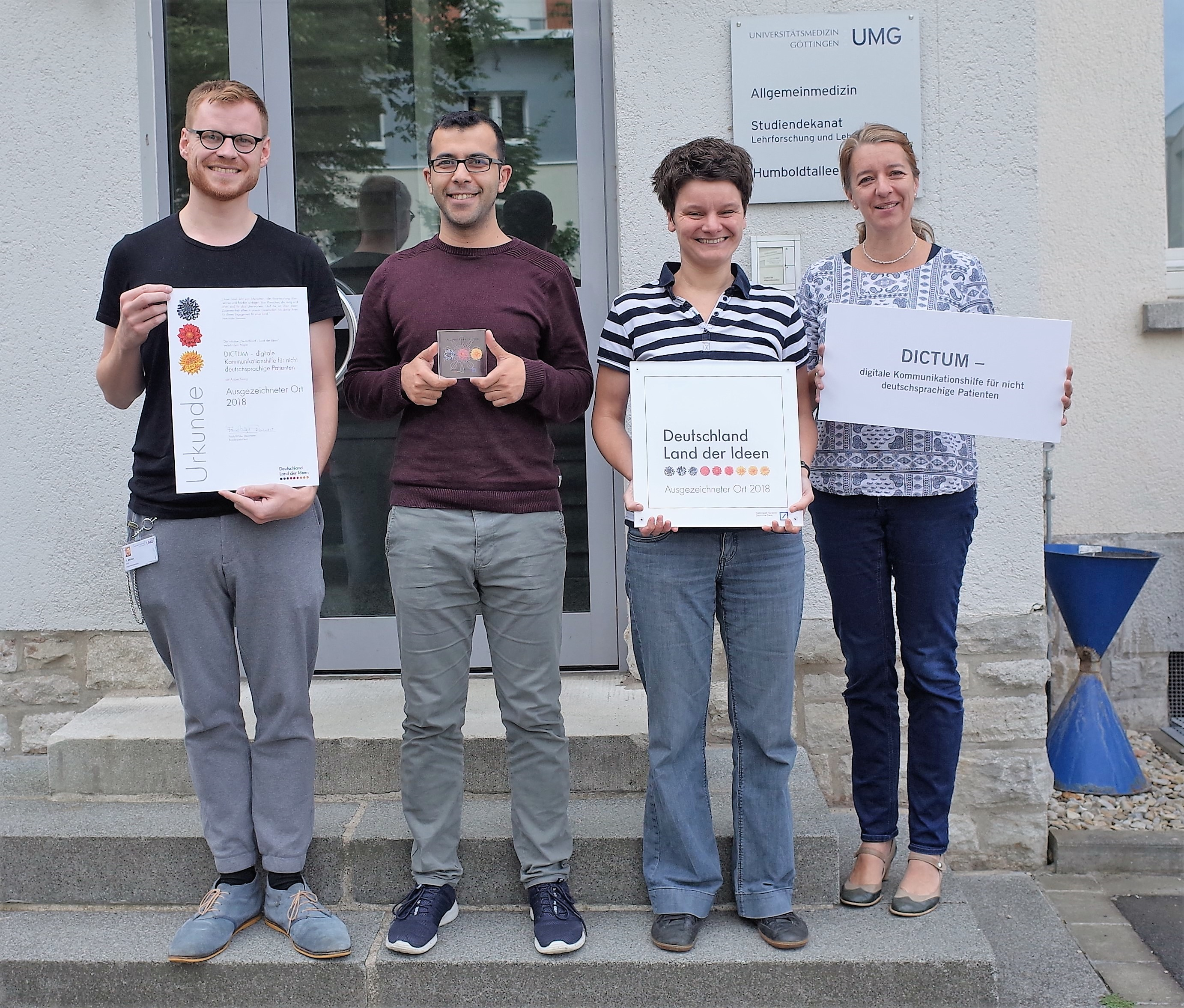
DICTUM-Team with the prizes. (from left to right: Frank Müller, Ghefar Furaijat, Dr. Evelyn Kleinert, Prof. Anne Simmenroth)
May 2018
The recruitment phase of the study started on 15.05.2018 as part of the DICTUM project. For this purpose, we appointed two study assistants at the primary healthcare center in Friedland. These assistants help the patients by handling the medical history application and also by the inclusion of those patients before seeing the doctor (consultation). They speak to the potential participants and clarify the motivation to participate in the study. Also, they check if the patient’s informed consent already exists and deliver tablets to the patients. They try to answer patients inquiries and questions. Regarding technical improvement, a feedback Module has been already implemented into the application, so that patients focus more on assessing the communication during the consultation and perform this feedback in their native language. Our study assistants work closely with the nursing staff and doctors at the primary healthcare center in Friedland. Our recruitment goal is 450 patients in the intervention group (who will be using DICTUM) and to be compared with 450 control patients (who have received medical treatment as before).
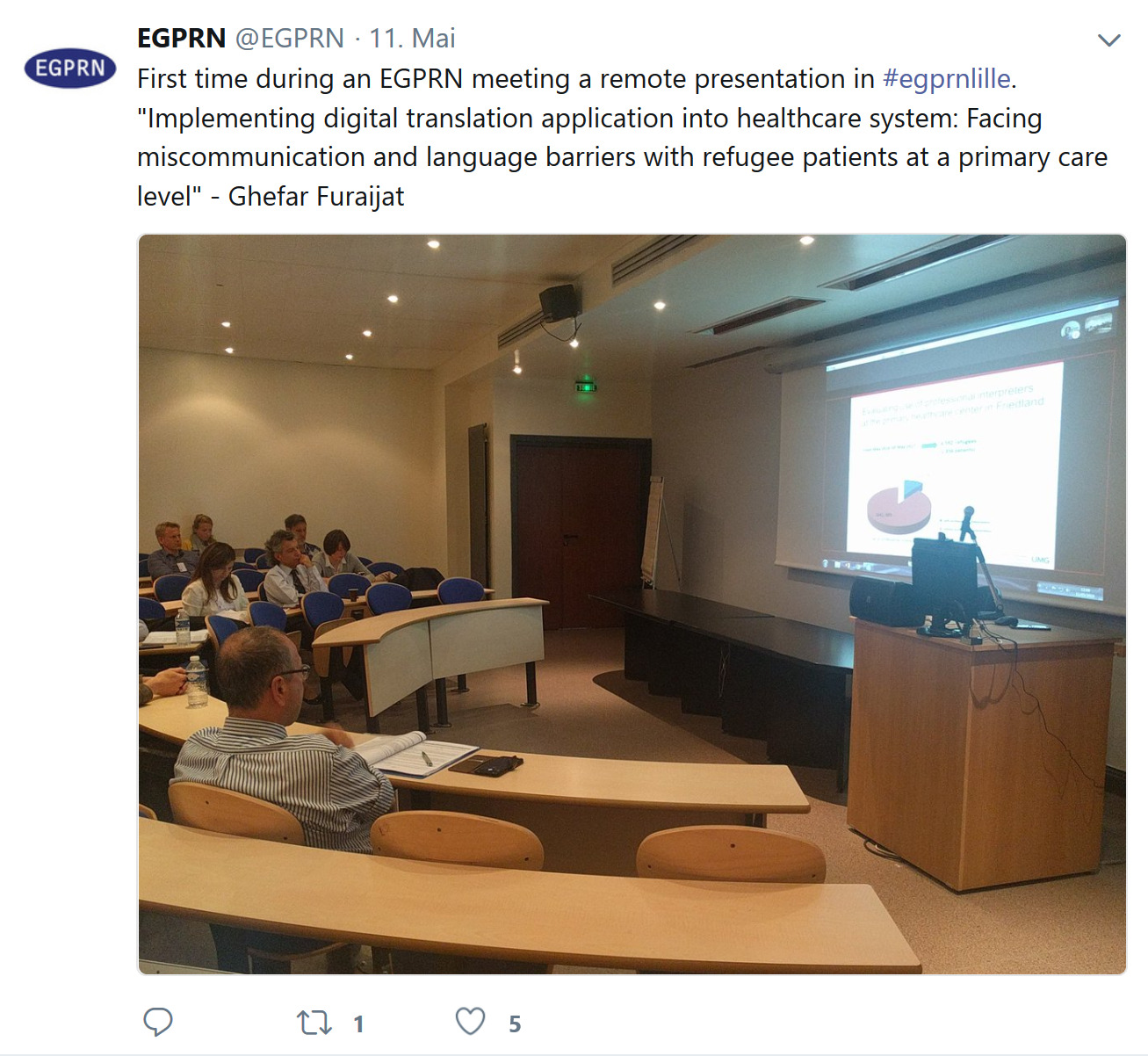
April 2018
The first scientific paper on the re-consultation rates by the refugee patients at the primary healthcare center in Friedland refugee camp has been accepted by the BMC Public Health journal for publication and is now undergoing a review process.
There is an ongoing preparation for a related research project, through which DICTUM will be used by paramedics to assess pre-clinical emergency situations. The preparation measures include writing funding applications and arranging implementation meetings. More details on the project will follow as soon as it becomes known.
March 2018
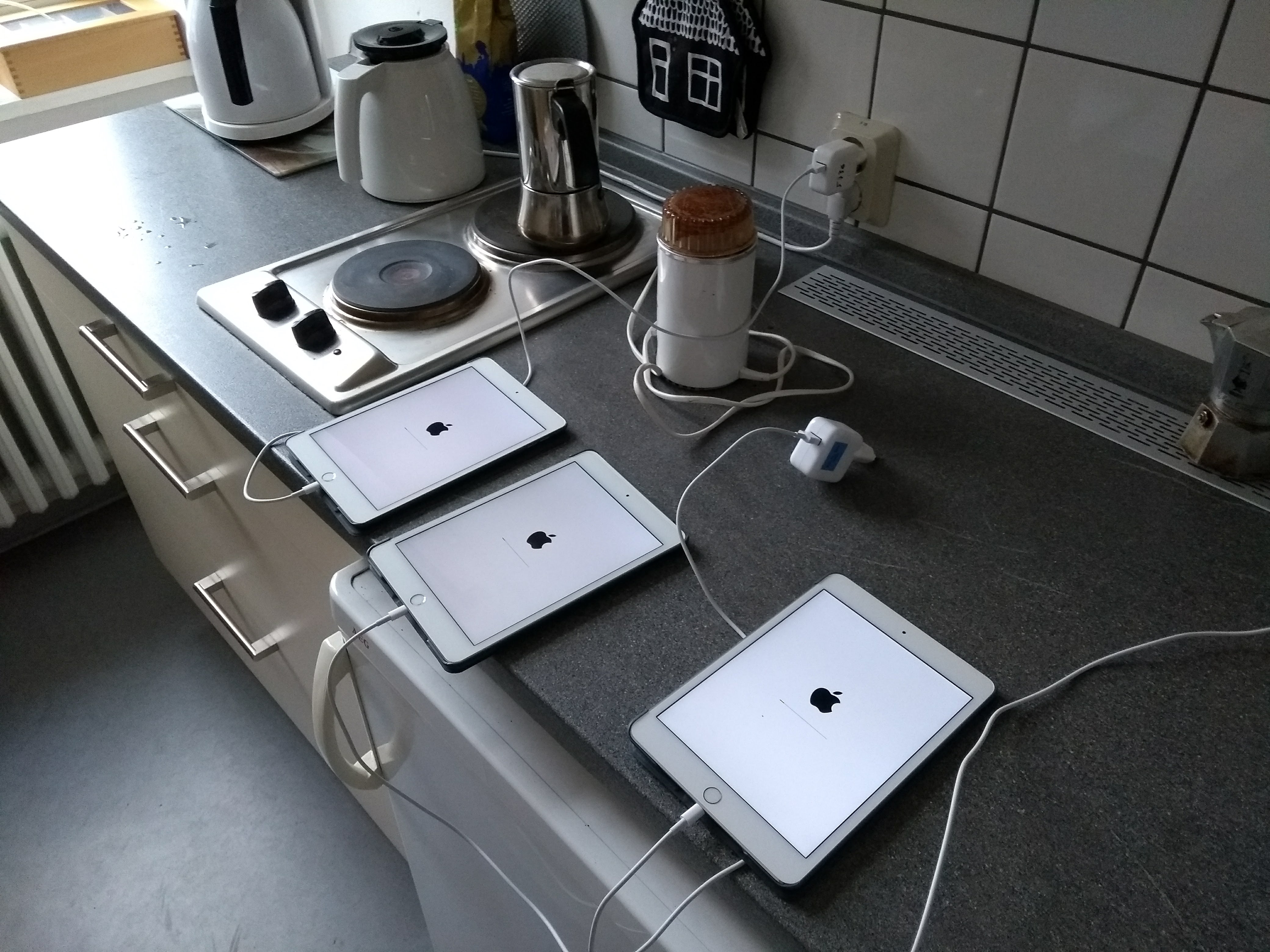
Updating the case-history tablets in the departments coffee-kitchen, here we found some unused sockets!
DICTUM Functions and operations have been further improved through recent update of the software by aidminutes. The new additions are especially important for people without previous digital media experience. In addition, at the end of the medical history patients are asked if they have been able to use the digital communication assistance tool well and if their main complaints and concerns have been answered.
The DICTUM project will be presented and discussed at two conferences in the spring: Frank Müller will speak at a specialist forum on the subject of "language mediation" at the Poverty and Health Conference in Berlin, Ghefar Furaijat will present results of the preliminary project at the European General Practice Research Network Lille (France).
FEBRUARY 2018
Two promising doctoral students have joined our project:
• Nele Hillermann on the topic: "Consumption of antibiotics in the medical care of refugees and migrants" and
• Sara Hassanin on "Prescription Patterns of Analgesics, Antidepressants, and Hypnotics in Refugee Population".
An additional doctoral thesis, assessing the use and benefits of the medical history software, is still under preparation.
JANUARY 2018
After finding out that the patients are not easily accessible through the social service bureau and that only very few patients could complete the medical history using the digital communication assistance tool at the social service, we decided to move the recruiting location to the primary healthcare center. Since there are no interpreters available in the primary healthcare center, we had a short testing period for 2 weeks in order to find out whether patients will be able to use the medical history tablets without previous functional explanations in the appropriate language. With aidminutes Team, we tried to explain to the patients (in German or English) in the waiting room the use of the software. We were partially supported by other patients who already used the tool. In this preliminary phase which took 8 days , 43 patients used the digital communication assistance tool and 38 have completed the medical history. Four people were unable to complete the medical history because they were called by the doctor in the consultation room, and one person quit using the medical history for other reasons. This test has shown that even without detailed knowledge of the language, it is possible for patients to explain the use of the tool and thus to include them in the study.
Figure. Languages used
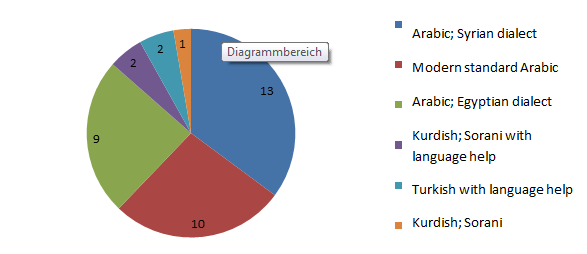
Since there are no available interpreters at the primary healthcare center to help with explaining and educating the patients on the digital communication assistance tool, we have found the information to study participation forward: Starting this spring, all potential patients are informed directly after their arrival in Friedland through interpreters about the digital communication assistance tool. A written informed consent will be obtained from those who are willing to participate in DICTUM. Corresponding information materials in different languages (including as video) were created. This approach also ensures that all patients’ inquiries regarding DICTUM can be answered directly by interpreters. In addition, patients will be asked in the waiting room once again about their previous informed consent and willingness to participate in the study.
In the future, two student assistants will be helping with providing the medical history tablets to the patients in the waiting room.
DEZEMBER 2017
At DICTUM partners meeting on 17 November 2017, we invited cooperation and financing institutions to assess the status of the project and the intervention at the border transit camp Friedland and also to discuss the status quo of the project. It shows a consistently positive response to the initial six months period of the pilot project. Intermediate target: The functional implementation of the DICTUM under study conditions. The current level of symptom queries accuracy and detailed descriptions as well as language and dialect sensitivity made the attendees admire the effectivity of DICTUM. The Göttinger Tageblatt reported also on the project here.
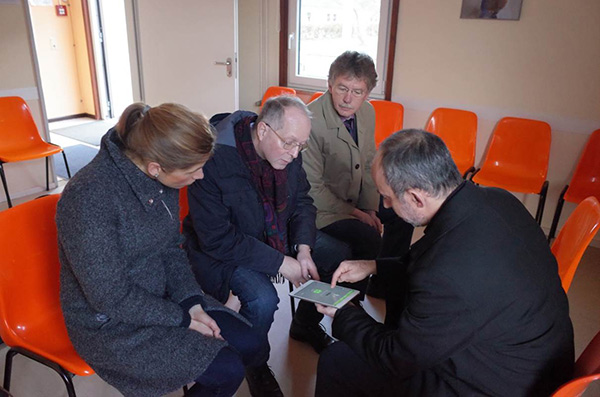
Hands-on experience in the waiting room of the primary health care center at Friedland, From left to right: A. Krüger (AOK Niedersachsen), H. Jeschonnek (KV Niedersachsen), H. Hörnschemeyer (GDL Friedland), B. Burchhardt (aidminutes)
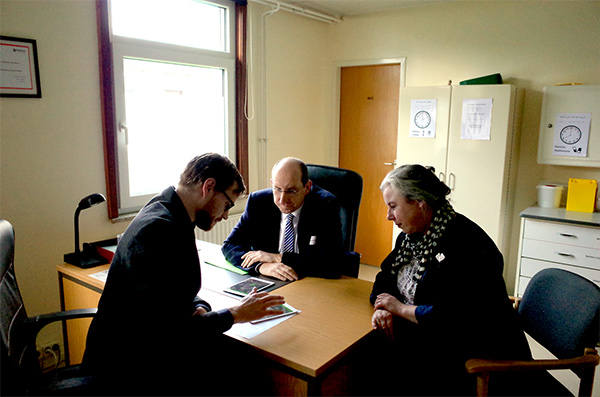
In a deep conversation: F.Müller (Institut of General Practice, UMG), M.Wunderling-Weilbier (Regional Commissioner for Regional Development) C. Morys-Wortmann (Health region Department Göttingen, South Lower Saxony)
NOVEMBER 2017
14.11.2017. In order to recruit more patients in the first few weeks of the trial; we looked for different ideas that could bring patient’s attention to the availability of the digital communication assistance tool. Last week, we designed and placed posters that could give an idea about DICTUM without language skills. This is accompanied by flyers, available in different languages. The posters are placed in the social service bureau, the primary care center, and other accommodation places in Friedland. Additionally, the introductory sessions for newcomers at the border transient station will point out the availability of DICTUM.
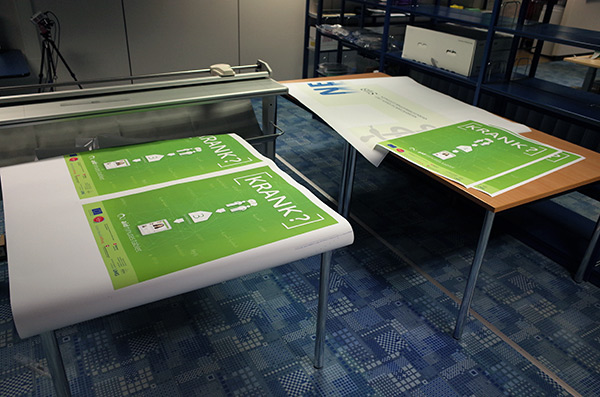
Poster freshly placed.
DICTUM has been chosen as an example of good practice project by the Lower Saxony Future forum, which is a special group of experts from different fields of science, business, administration, and sociology, that is set up by the state government. In their final report of the 3rd working cycle on digitalization opportunities, they recommend to the state government "to support the dissemination of digital communication assistance tools in other initial reception refugee centers as well as the implementation of these tools in the primary healthcare fields (family physicians / hospitals / emergency room, etc.) ".
You can find the full article on DICTUM here.
You can also find the final general report here.
For further information, you can go to the homepage of the Lower Saxony Future forum.
On November 6th, 2017 DICTUM team participated in a primary care quality circle at Hardegsen (Dr. Löber / Dr. Knöpfel Clinic). In this quality circle, some colleagues had the chance to try DICTUM German version by themselves and see how it would be implemented into their daily work.
OCTOBER 2017
We are inviting our cooperation partners cordially to the first DICTUM cooperation meeting.
The meeting is on Friday, November 17th, 2017 (11 till 13 o’clock) at the border transient refugee camp in Friedland (House N.4, Room 126).
We would like to report the project current status and show the premises on site.
The participating partners are invited in advance to the meeting. However, if you are interested in joining our meeting and you have not been contacted, it would please us to receive an email from you at the following address (info@dictum-friedland.de).
In the second week of October, we started a series of lectures aimed at training the healthcare personnel as well as the social workers on using the digital communication assistance tool and getting acquainted with the trial procedures. In addition, the software was tested through some patients (or through their parents, who have used it on behalf of their children). The first experiences are promising and the patients’ first reactions are encouraging. In order to collect these experiences in a structured manner, daily reports about them are documented regularly.
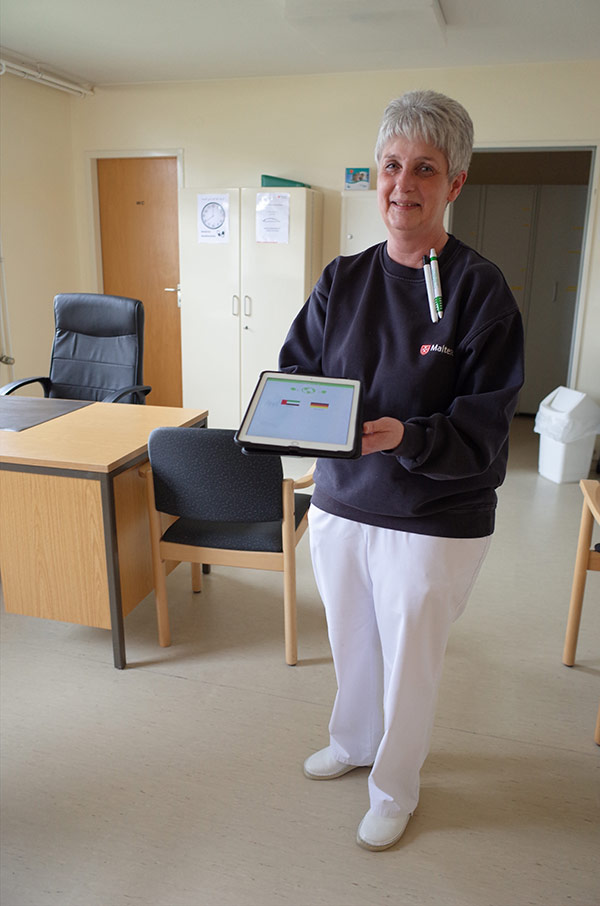
A nurse at the primary care center in border transient station Friedland
The development, inspection, and revision of the digital communication assistance tool to reach a functional level are almost complete. The technical equipment of the trial is to a large extent installed in the primary care center. The entered and used languages are:
- German,
- Arabic (Modern Standard Arabic, Moroccan, Syrian, Tunisian, Egyptian),
- Persian,
- Kurdish (Sorani, Kurmanji),
- Turkish,
- Pashto (Kandahari, Mazurka).
The Kurdish language Feyli will be added soon. Likewise, in some languages, there are still missing voice/video parts which will be later recorded by the interpreters and added to DICTUM.
Since the beginning of October, three medical doctoral students joined DICTUM research efforts by examining further questions and thesis of the trial.
SEPTEMBER 2017
We have registered DICTUM in the German Clinical Trial Register (DRKS): (DRKS-ID: DRKS00013076).
The trial information has also been sent to the World Health Organization Directory (WHO), where further trial details will be available for interested visitors.
ATo be prepared for the data collection phase, we have teamed up with the healthcare personnel at the primary care center in Friedland to introduce the new digital communication assistance tool and its effects on the daily work habits (e.g. The medical Summary effects on simplifying the consultations procedure).
JULY 2017
Dr.Evelyn Kleinert (social scientist) and Ghefar Furaijat M.D (physician) joined DICTUM team.

From left to right: Evelyn Kleinert, Anne Simmenroth, Frank Müller, and Ghefar Furaijat
We are working together with our project partner (aidminute) on patients’ medical education information in multiple languages. As it turns out that many terms (which were submitted in the patients’ medical educational information to the ethical committee) could not be translated meaningfully in some of the target languages. E.g. in some Arabic dialects the term (communication assistance) could be hardly translated. We are discussing possible alternatives with interpreters and translators to find similar phrases that could provide intended meaning without confusing the patients. For this purpose, we have added a supplement to the ethical committee in order to change the nuances of questions so that we can ensure better and understandable translation. This change would also make it possible to use simple idioms and terms from other supported languages.
JUNE 2017
The first announcement of DICTUM in (Impu!se) Journal of the national association for health and academy for socialized medicine in Lower Saxony as well as in Lower Saxony medical association journal.
Meanwhile, the first material orders have arrived including iPads, hard drives, video material, etc...
MAY 2017
On May 2nd, 2017, Lower Saxony’s Secretary of State, Birgit Honé, and Regional Commissioner, Matthias Wunderling-Weilbier, presented a grant to DICTUM team.
Innovative projects are funded to adjust enterprises and workers to the current social changes, as well as to improve access to health and social services. The funding for this project comes from the European Social Fund (ESF).
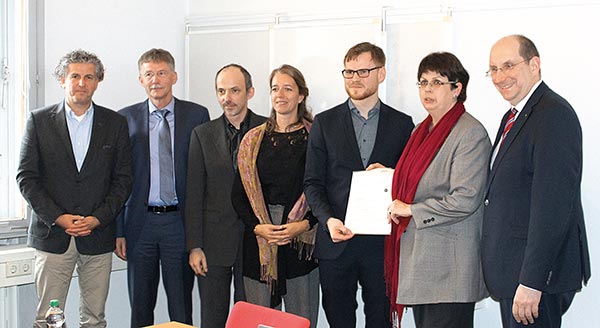
From Right to left. Raphael Ebenhoch (managing director of the Maltese diocese of Hildesheim), Heinrich Hörnschemeyer (head of the border transit camp Friedland), Boran Burchhardt (director of aidminutes), Anne Simmenroth (project research director ), Frank Müller (project research director), Birgit Honé (state secretary), Matthias Wunderling- Weilbier (regional representative)
APRIL 2017
Dictum Project started officially on April 1st, 2017. The ethical approval was obtained on March 16th, 2017 from the ethical committee at the University Medical Center Göttingen.
